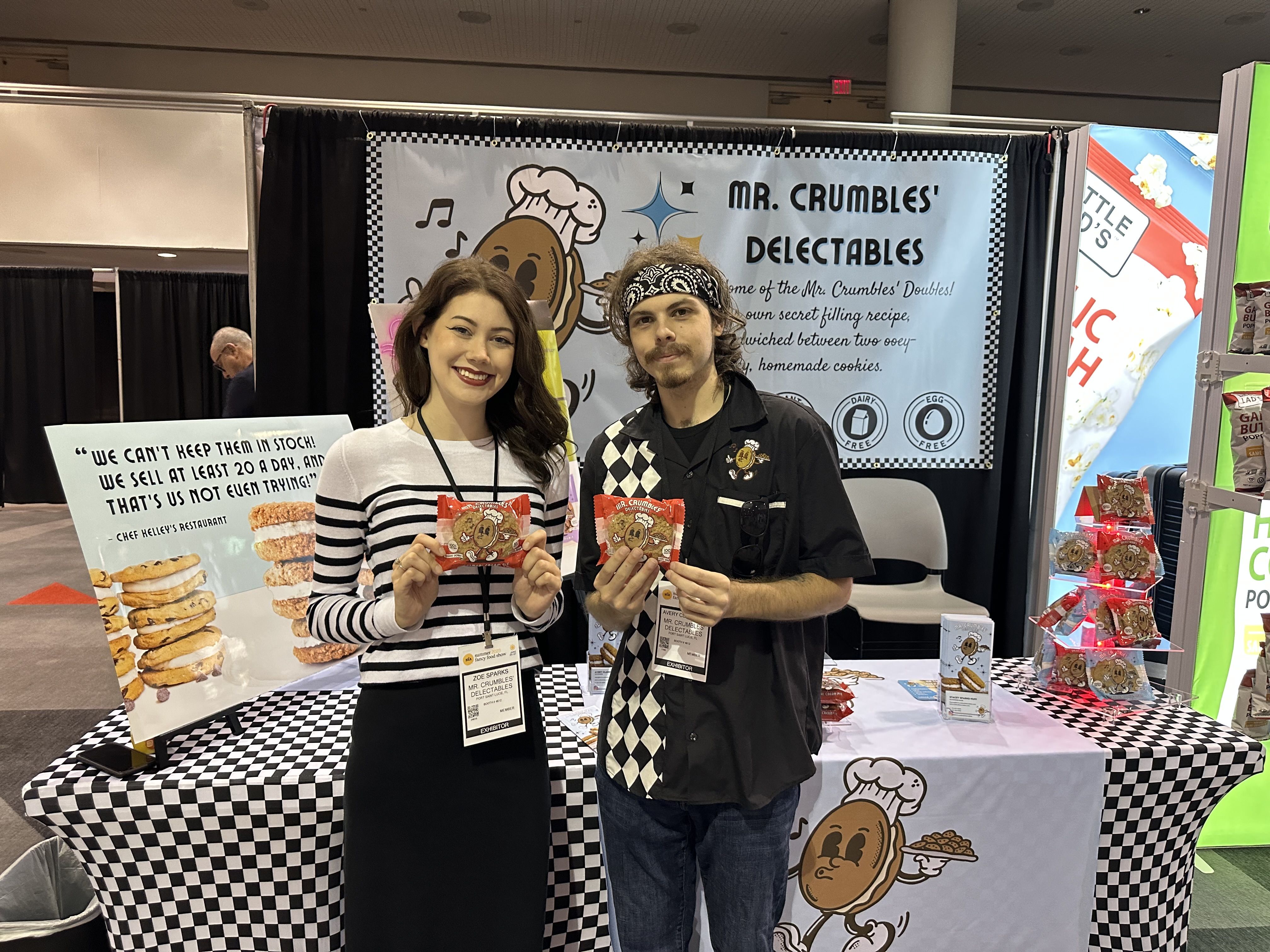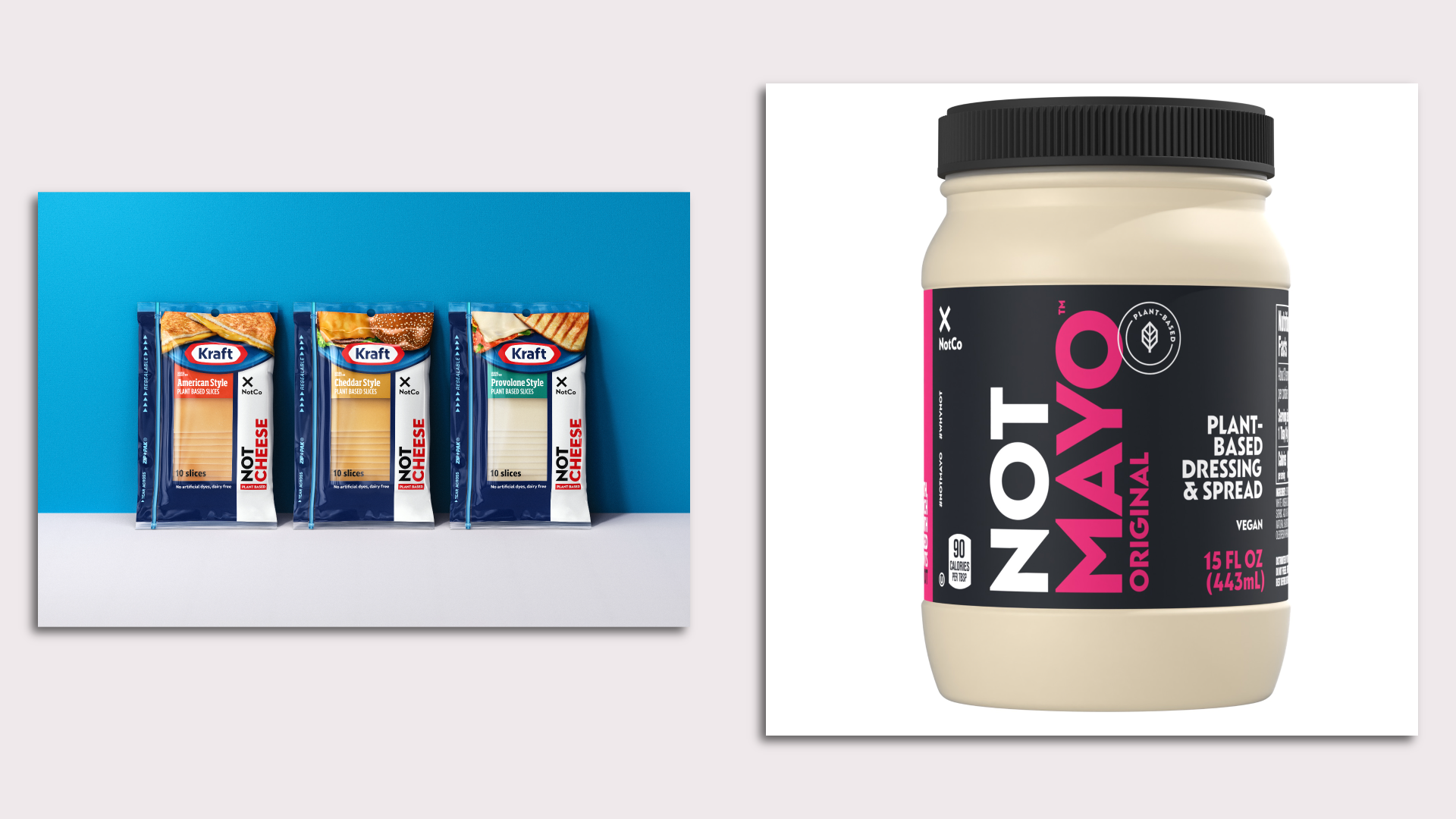Food makers are tripping over themselves to introduce new "plant-based" products — but many are shying away from the term "vegan," which some perceive as having negative or off-putting connotations.
Why it matters: The two terms aren't always synonymous — "vegan" tends to refer to a lifestyle as well as a diet, in which all animal products, including honey, are avoided.
- But the semantic differences are critically important to marketers, as demand for animal-free foodstuffs balloons.
Driving the news: Novel plant-based foods were out in full force at last week's Summer Fancy Food Show at New York City's Javits Center — a prominent showcase for new products — but many of the entrepreneurs behind them said they consciously avoided the "vegan" label.
- They emphasized in conversations that their products were vegan — but heralding that quality on packaging or advertising might turn off more customers than it attracts.
- "Most people turn up their nose at foods that are allergen-free, gluten-free or vegan," said Nubian Simmons, founder of The Pink Bakery in Milwaukee, as she proffered a brownie made from her allergen-free mix. "Would you know that that is a vegan brownie? It tastes good, right?"
- Over at Mr. Crumbles' Delectables — which makes vegan oatmeal cream pies — founder Stacey Sparks-Huff uses the term "100% plant-based" in her marketing because "I think that's more acceptable to people."
What they're saying: "'Vegan' is more of a lifestyle and more associated with the animal aspect and the environment," said Zoe Sparks, Sparks-Huff's niece, who was handing out the company's vegan cookies.
- "'Plant-based' has broader appeal," with more positive health implications, Sparks said. "A lot more people eat plant-based diets," if not all the time, then a few times a week.
- She added: 'The term 'vegan' is really more faux pas now unless it's associated with the lifestyle."

Getting technical: "I say 'plant-based' because it's not as narrow — I think that 'vegan' is a bit more specific," said Stephanie Schaich Bricken, founder of Seraphim Social Beverages, an alcohol-free line of wines made with organic sour cherries and the like.
Yes, but: Foods brandishing the "vegan" label were also on proud display at the food show — and more broadly in my inbox of food-related press releases.
Where it stands: Companies seem to be choosing sides, opting to describe their products as either "plant-based" or "vegan" — but not both.
- In one camp: Wildfare vegan pastas, Popadelics' "surprisingly vegan" mushroom chips, Van Leeuwen's vegan ice cream — there's even a bottled water called ShineWater marketing itself as a "vegan brand" (hey... it's water!).
- In the other camp: Nestlé's plant-based Toll House morsels, Kraft Heinz's plant-based "Not Cheese" slices and "Not Mayo," Jack & Friends plant-based jackfruit jerky — plus too many other new products to mention.

Between the lines: There's been a conscious effort throughout the food world to make plant-based foods taste better — and to telegraph that deliciousness — in part because of the vicissitudes of plant-based meat.
- "At the end of the day, if it doesn't taste good, nobody’s going to come back for more unless they're purists," says Marie Wright of food processing giant ADM, who leads a team of more than 700 who develop plant-based foods and flavors.
- "I think if we had tasted some of these plant-based products five years ago, the taste wasn't great," Wright tells Axios. "I think we've gotten better in a number of ways" at producing better-tasting versions.
Zoom out: Some food startup investors are steering clear of the "vegan" descriptor because the average consumer leans more toward a "reducetarian" diet, where they aim to reduce — but not eliminate — animal products.
- "Vegan is kind of becoming a term that's out of favor because people associate it with too much crunchiness, or whatever," says Johnny Ream, a managing partner at Stray Dog Capital, who has invested in such plant-based companies as Beyond Meat and Purple Carrot.
- A brand is "probably at a disadvantage" if it describes itself as vegan, Ream tells Axios.
Zack Bishti, CEO and co-founder of the plant-based chain Neat Burger — an English company that recently opened in Manhattan — echoed Ream's sentiments, saying his target customers are "meat eaters that are trying to eat less meat."
- "I don't even use the word 'vegan' because this instantly puts off loads of people," Bishti tells Axios.
- "When you say 'vegan,' it's like 'no' because they associate it with bean patties. They associate it with, like, a cauliflower burger."
Jennifer's recommendations: After several months of pointedly (but unscientifically) sampling new vegan and plant-based products, my favorites are the Kraft "Not Cheese," the new Nestlé's chocolate morsels (indistinguishable from the originals, IMHO), and Mr. Crumbles' oatmeal cream pies — which, I'm afraid, may be scarce for a while after a star turn at the trade show.
- The Neat Burger sandwiches I tried were incredibly tasty as well.
- But the various brands of plant-based tuna alternatives that I tasted were far from appetizing — and our cat Wilson, a tuna lover, wouldn't touch them.







